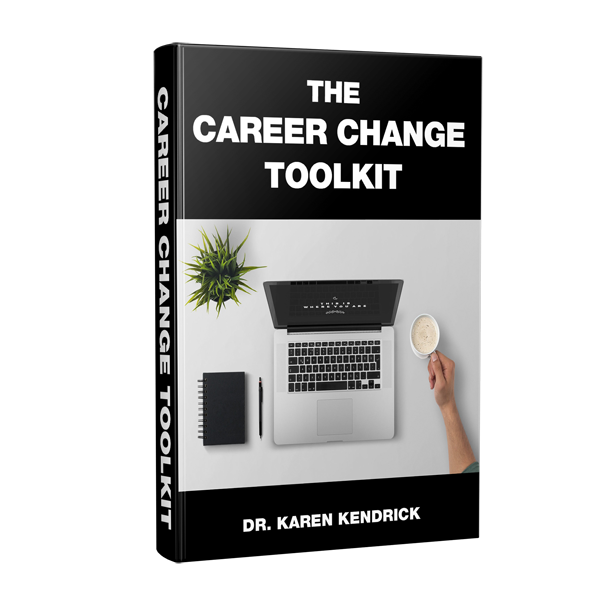HOW TO MAKE A SUCCESSFUL CAREER CHANGE
Work takes up a big part of our lives. It can give us a sense of purpose and accomplishment, provide financial support, and give us much needed socialization.
It can also help build skill and confidence and provide a source of creative expression.
But if you’re stuck doing work that you don’t enjoy, it can be a huge source of unhappiness, frustration, and burnout. So needless to say, taking the time to find work that is satisfying is an important part of living a happy and healthy life.
If you’re discontent with the work you do now, it’s natural to consider switching jobs or careers. The question is, how do you navigate this process most effectively and not just jump from one unsatisfying job to another?
Here are 8 keys to making a successful career or job change:
1) Clarify what you hope to gain from the career or job change
Given the time and energy that it can take to change jobs or a career, you want to be clear about what’s driving your motivation. Are you just trying to escape a bad situation and therefore you may be less choosy about a new career/job? Are looking for work in an industry that pays better or has more stability? Do you want to be challenged more or have a chance to broaden your leadership skills? Do you like your work but just hate your boss or the company?
Really ask yourself how your life will be better by making the change.
Getting clear on your goals will help you assess your true level of commitment to pursue a new path and help you determine your decision criteria for new opportunities.

Get a FREE copy of The Career Change Toolkit.
Jumpstart your journey to finding work you love.
2) Determine if doing similar work in a different environment would provide enough improvement
It’s always easier to find similar work in a different setting (i.e., different boss, company, location, etc.) than to change to a different line of work where different skills might be required. Ask, “Could I be satisfied if I just moved to a different company/department/city/etc. using my same skills, doing similar tasks?”
If the answer is yes, then focus your efforts on just changing jobs within your company or industry. If the answer is no, then you’ll need to think further about how your skill set, education, etc. might apply to a new field of work.
3) Do a full inventory of your skills, aptitudes, knowledge, work and life experience, accomplishments, education, and passions/interests
Whether you decide to just switch jobs in your existing line of work or want to make a major career change, you’ll need to fully understand what capabilities you have. This goes beyond just polishing up your resume/CV.
Dig deeper and look at what knowledge and skills you’ve acquired throughout your life that you may or may not be using in your current work.
Not only is this an empowering exercise when you really look at all you know and have done, but it will potentially unlock some new insights about possible job or career paths. Once you’ve drafted your inventory, share it with family and friends to get feedback and confirm you haven’t left out important details. It’s easy to overlook things you take for granted that others may see as a natural gift, unique experience, or valuable skill.
4) Match your finalized inventory with potential job or career options
Share your finalized inventory with your personal/professional network to get ideas on specific jobs and careers.
Talk with a broad array of people from different industries and perspectives to get a good list of options and the pros/cons of each.
Use online career finder tools if necessary to help you generate ideas or rule things out. If necessary, drill down into what topics, tasks, and environments you like best to help you hone in on specific job/career possibilities. Again, there are many online tools for this.
If you already have an idea for a specific job or career, then use your network discussions to help refine things further and get the word out that you are looking.
Consider what additional education/training/experience you might need to acquire and weigh this in your decision process, as well as the economic outlook for work in this field. Use your inventory as a reference when applying for work online and posting your work/skills profile.
5) Develop a target list of industries/companies/job titles (roles) based on your research and a specific set of criteria for evaluating opportunities
To narrow down your search, target roughly 3-5 industries, 20-40 companies, and 3-5 job titles/roles that you think would be the best fit. While your specific numbers may vary based on location and your specific line of work, these target numbers are a reasonable average to shoot for. Don’t worry that you are being too narrow at this point. You can always broaden your search out over time.
The purpose here is to force you to focus your efforts and allow you to be clearer in explaining to others what you are looking for.
In addition to the target list, create a set of criteria that your job/career opportunities should meet. Consider things like minimum pay/salary, job location, health benefits, ability to work from home, travel requirements, etc. Be clear about your constraints, such as not being able/willing to relocate, having a commute time less than 1 hour, etc.
Note: If you decide that your career change is to start a business and be self-employed, than you can use the industry/company/job titles exercise as part of your thinking about your target customer. Ask yourself who do you want to serve and work with as a small business owner.
WANT TO FAST-TRACK YOUR PATH TO FINDING WORK YOU LOVE?
Take the BRILLIANT PURPOSE™ digital course.
6) Enlist as much support as possible in identifying and evaluating opportunities
Your goal here should be to generate as many high-quality options for yourself as possible in a compressed period of time. Don’t overly rely just on word of mouth or solely on internet websites. Use every resource available to you and spread the word (except to current co-workers if your work search isn’t public).
Attend network events, career fairs, etc. Use your social activities as another opportunity to discuss your goals and potential opportunities.
You never know where a job/career lead might come from, including from casual conversations within your local community.
Meet and talk with as many people as possible, especially those who work in your target field or industry. Ask for feedback about offers and get as much perspective as possible to help inform your decisions.
7) Maintain or enhance your self-care routine during this time
The stress and uncertainty of going through a job/career change requires extra stamina and focus. Yet at this time, it can be easy to fall out of normal routines and neglect some of your self-care. To really optimize your transition process, stay committed to getting good sleep, eating healthy foods, getting exercise, and staying hydrated. This will help ensure you’re clear-headed and energetic to take action and make good choices.
8) Set yourself up for success once you’ve started your new job/career
As you get underway with your new role, focus on learning as much as you can, nurture both new and existing relationships, and get whatever training and equipment will help you be most successful. Thank all those who helped you during your transition and let them know about your new work. Be assertive in developing rapport with new contacts that you’ll be working with. Expect to work more hours initially to come up the learning curve as fast as possible. When you see these as important investments of your time, you’ll be well on your way to success in your new work.
DIVE DEEPER: Get full clarity about all of your skills, abilities, and talents here so you can identify a greater set of job or career options.

Get a FREE copy of The Career Change Toolkit!
Jumpstart your journey to finding work you love.
IF YOU LIKED THIS CONTENT, CHECK OUT:
NEW TO KAREN?

